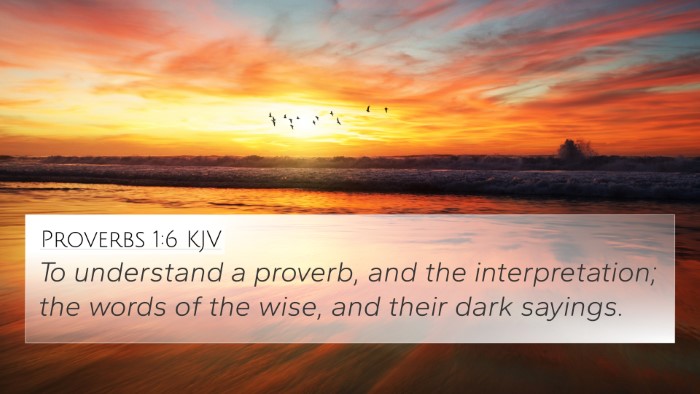Understanding John 16:25
John 16:25 (KJV): "These things have I spoken unto you in proverbs: but the time cometh, when I shall no more speak unto you in proverbs, but I shall show you plainly of the Father."
Summary of Meaning
The verse John 16:25 serves as a significant point within Jesus' farewell discourse to His disciples. It highlights the shift in communication that will occur once the Holy Spirit is sent, allowing for a clearer revelation of divine truths. This verse emphasizes the transition from metaphorical language to direct and plain communication regarding God the Father.
Insights from Public Domain Commentaries
-
Matthew Henry
Matthew Henry explains that Jesus often spoke in proverbs or parables to convey deeper spiritual truths while maintaining a level of mystery. His statement indicates that a time is coming when His teachings will be more direct, especially after His resurrection and the coming of the Holy Spirit. This change is intended to bring greater understanding of God’s nature and intentions.
-
Albert Barnes
Albert Barnes comments that during Jesus’ earthly ministry, the truth was revealed progressively through symbols and figurative language. He emphasizes the importance of the Holy Spirit in clarifying these messages, which will lead believers to a more profound understanding of God. The promise of clearer communication is indicative of God’s desire for His followers to obtain a full revelation of His character.
-
Adam Clarke
Adam Clarke discusses the context of this verse, focusing on the 'proverbs' as a reference to Jesus’ teachings veiled in metaphor. He notes that Jesus affirms that His future teaching will be unambiguous and straightforward, helping believers conceive a full comprehension of the Father. Clarke also ties this clarity to the overall mission of Jesus, which is to reveal the Father to humanity.
Bible Verse Cross-References
For a deeper understanding of John 16:25, consider the following related verses which illustrate the themes of direct revelation and understanding in the context of the Holy Spirit:
- John 14:26 - "But the Comforter, which is the Holy Ghost, whom the Father will send in my name, he shall teach you all things, and bring all things to your remembrance, whatsoever I have said unto you."
- John 15:15 - "Henceforth I call you not servants; for the servant knoweth not what his lord doeth: but I have called you friends; for all things that I have heard of my Father I have made known unto you."
- 1 Corinthians 2:10-12 - "But God hath revealed them unto us by his Spirit: for the Spirit searcheth all things, yea, the deep things of God..."
- Matthew 13:11 - "He answered and said unto them, Because it is given unto you to know the mysteries of the kingdom of heaven, but to them it is not given."
- Luke 24:45 - "Then opened he their understanding, that they might understand the scriptures."
- Hebrews 1:1-2 - "God, who at sundry times and in divers manners spake in time past unto the fathers by the prophets, hath in these last days spoken unto us by his Son..."
- James 1:5 - "If any of you lack wisdom, let him ask of God, that giveth to all men liberally, and upbraideth not; and it shall be given him."
Connections Between Bible Verses
John 16:25 connects deeply with other scriptures, offering a lens through which to view the overall narrative of grace and the role of the Holy Spirit. The promise of direct understanding reflects God's willingness to engage intimately with His creation:
-
Thematic Relation: The use of 'proverbs' suggests a time of teaching through parables, connecting to Matthew 13:34-35 where Jesus says He speaks in parables to fulfill prophecy.
-
Enhanced Revelation: In John 16:13, Jesus promises that the Spirit will guide to all truth, echoing the sentiment in 16:25 regarding the clear revelation from Jesus about the Father.
Cross-Referencing Biblical Texts
The act of cross-referencing in the Bible serves as a vital tool for understanding the depth of scripture. John 16:25 can be utilized as an anchor point to explore various interconnections:
-
Direct Access to God
Hebrews 4:16 emphasizes believers' direct access to God's throne, showcasing how the clarity of Jesus' teachings enables this relationship.
-
The Role of Faith
John 17:3 stresses eternal life through knowledge of God, illustrating the correlation between knowing the Father and faith grounded in revelation.
Comparative Bible Verse Analysis
The transitions from proverbs to plain speaking suggest a broader thematic journey throughout scripture. For instance:
- Genesis 32:30: Jacob wrestles and sees God face to face, linking to the idea of divine revelation throughout scripture.
- Revelation 3:20: The invitation to dine with Christ reflects a direct relationship that mirrors the clarity mentioned in John 16:25.
Tools for Bible Cross-Referencing
To delve deeper into the connections of scripture, various tools and methods can enhance understanding:
- Bible Concordance: A useful resource for finding specific words and their occurrences throughout the Bible.
- Bible Cross-Reference Guide: Offers insights into related verses and themes for deeper study.
- Cross-Reference Bible Study: Engaging with the text by finding parallels and contrasts across different books.
How to Use Bible Cross-References
Selecting the right approach to cross-referencing enhances one's study:
- Identify key themes or words in John 16:25, then search for those within the entirety of scripture.
- Utilize digital resources or physical guides to find and compare verses that are linked thematically.
- Engage in group studies, discussing parallels and differences between related verses.
Conclusion
John 16:25 encapsulates the promise of clearer communication between God and His creation, underscoring the role of the Holy Spirit in this transformative process. By cross-referencing this verse with others throughout the Bible, we deepen our understanding of God's intention to reveal Himself and foster close relationships with His people.
















